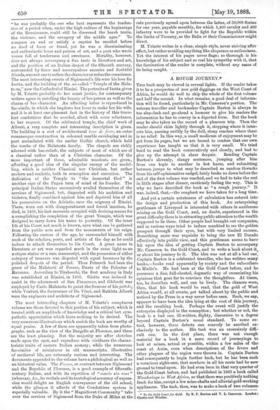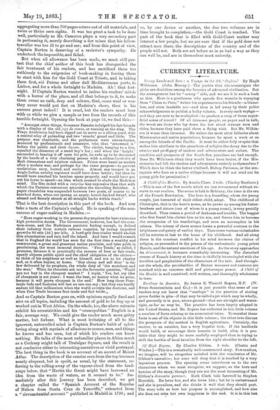A ROUGH JOURNEY.*
Tins book may be viewed in several lights. If the reader taker it to be a prospectus of new gold diggings on the West Coast of Africa, he would do well to skip the whole of the first volume and half the second. In what remains, a good deal of informa- tion will be found, particularly in Mr. Cameron's portion. The traveller and bookmaker Captain Burton is always • in too slap-dash and go-ahead a humour to give his readers the information he has to convey in a digested form. But the book may be also taken as the record of a pleasure trip. Then the should skim lightly through it, stopping where it inter- ests him, passing swiftly by the dull, stony reaches where there- is no relief. In this way, a small modicum of enjoyment may be got from ite pages, but we are bound to confess that our own experience has taught us that it is very small. We tried hard to read the book consecutively and closely, and had to. give up the attempt in sheer despair. Reading Captain Burton's slovenly, slangy sentences, jumping after him from one topic to another in hot haste, and submitting- between jumps to what may be described as random thwacks from his self-opinionative cudgel, fairly broke us down before the- end of the first volume was reached, and we had to take the rest in little stages after dinner, cautiously feeling the way. This is why we have described the book as " a rough journey." It was, indeed, that, —the roughest we have taken for a long time.. And yet a certain astuteness of calculation has entered into•• the design and production of this book. An enterprising- gentleman of Liverpool is interested with others in auriferous mining on the Gold Coast, and, no doubt, experienced in the great difficulty there is in attracting public attention to the wealth supposed to lie there. Other people had brought out companies, and in various ways tried to induce mankind to see the golden prospect through their eyes, but with very limited success.. Something more was requisite to bring the new El Dorado effectively into public view, and this gentleman seems to have hit upon the idea of getting Captain Burton to accompany Mr. Cameron to the Gold Coast, and to write a book about its or about his journey to it. The idea was not at all a bad one.. Captain Barton is a celebrated traveller, who has written many books,—books read apparently by society and the subscribers to Mudie's. He bad been at the Gold Coast before, and he- possesses a fine, full-chested, dogmatic way of enunciating his- opinions that goes far to convince the thoughtless. At times, too, he describes well, and can be lively. The chances were, then, that his book would be read, that the gold of West Africa would, at all events, get talked about by the public and noticed by the Press in a way never before seen. Such, we say, appears to have been the idea lying at the root of this journey,. and the resulting book. Perhaps the event will justify the enterprise displayed in the conception ; but whether or not, the book is a bad one, ill-written, flighty, discursive to a degree beyond Captain Burton's usual standard. To some ex- tent, however, these defects can scarcely be ascribed ex- clusively to the author. His task was an excessively diffi- cult one. In the first place, there was not enough material for a book in a mere record of journeyings to• look at mines, actual or possible, within a few miles. of -the coast at Axim, even when descriptions of the fevers and other plagues of the region were thrown in. Captain Burton, had consequently to begin further back, but he has been such a voracious sight-seer, that nowhere in all his route had he new ground to tread upon. He had even been in that very quarter of the Gold Coast before, and had published in 1863 a book called Wanderings in West Africa, so that there was positively nothing fresh for him, except a few mine-shafts and alluvial gold-working appliances. The task, then, was to make a book of two volumes, • To the Gold Coca for Gold. By B. F. Burton add 'V. L. Cameron. London : Matto and Windua.
aggregating more.than 700 pages octavo out of old materials, and twice or thrice seen sights. It was too great a task to be done well, particularly as Mr. Cameron plays a very secondary part in performing it, merely describing a few mines that his fellow- traveller was too ill to go and see; and from this point of view, Captain Burton is deserving of a reviewer's sympathy. He .undertook the impossible, and failed.
But when all allowance has been made, we must still pro- test that the chief author of this book has disregarded the fair treatment of his readers, and has sacrificed them too ruthlessly to the exigencies of book-making in forcing them
to start with him for the Gold Coast at Trieste, and in taking them first, vial Patras and other dull Mediterranean ports, to Lisbon, and for a whole fortnight to Madeira. Ah ! that fort- night. If Captain Burton wanted to imbue his readers' minds with a horror of the place, and all that belongs to it, to make them swear an oath, deep and solemn, that, come weal or woe,
they never would put foot on Madeira's shore, then is his success great indeed ! It is cruel, but the readers must bear with us while we give a sample or two from the records of this terrible fortnight Opening the book at page 54, we find this :—
" Amongst other things, Governor Farrobo indulged his fair friends with a display of the old jogo de canes, or running at the ring. The Praca Academica had been rigged out to serve as a tilting-yard, with a central alley of palisading and two stands,' grand and little. The purpose was charitable, and the performers were circus-horses, mounted by professionals and amateurs, who thus 'renowned it' before the public and their dames. The circlet, hanging to a line, -equalled the diameter of a small boy's hat ; and when the knight ' succeeded in bearing it off upon his pole, he rode up to be decorated by the hands of a very charming person with a ribbon-basdriere of Bath dimensions and rainbow colours. Prizes were banal as medals after a modern war, and perhaps for the same purpose—to prevent unchristian envy, hatred, and malice. Almost any trooper in an Anglo-Indian cavalry regiment would have done better ; but then he would have couched his bamboo spear properly, and would have put out his horse to speed—an idea which seemed to elude the Madeiran mind. The fete ended with a surprise less expensive than that with which the Parisian restaurant astonishes the travelling Britisher. A paper chandelier was suspended between two posts, of course to be knocked down, when out sprang an angry, hunch-backed dwarf, who abused and fiercely struck at all straight backs within reach."
That is the best description in this part of the book. And now take a taste of the Captain's cudgel. He is speaking of the non- success of sugar-making in Madeira:—
" Here sugar-working in the present day requires for bare existence high protective duties. The Government, however, has had the com- mon-sense, and the Madeirans patriotic feeling enough, to defend their industry from certain ruinous vagaries, by taxing imported growths SO rein (4d.) per kilo. A hard-grit free-trader would abolish this abomination and ruin half the island. And here I would remark that in England the world has seen for the first time a wealthy and -commercial, a great and generous nation proclaim, and take pride in proclaiming, the most immoral doctrine. ' Free Trade,' so called, I presume, because it is practically the reverse of free or fair trade, openly abjures public spirit and the chief obligation of the citizen— 'to think of his neighbour as well as himself, and not to let charity end, as it often begins,Ot home. Buy cheap and sell dear' is the law delivered by its prophets, the whole duty of 'the merchant and the man.' When its theorists ask me the favourite question, ' Would you not buy in the cheapest market ?' I reply, Yes, but my idea of cheapness is not yours : I want the best, no matter what its price, because it will prove cheapest in the end.' How long these Free- trade fads and fooleries will last no one can say ; but they can hardly endure till that millennium when the world accepts the doctrine, and when Free Trade becomes free trade and fair trade.,,
And so Captain Burton goes on, with opinions equally fixed and nice on all topics, including the amount of gold to be dug up or worked out in West Africa. On the whole, too, the above extracts exhibit his eccentricities and his " cosmopolitan " English in a fair, average way. We could give the reader much more gritty matter, but forbear. What is most irritating of all to the ignorant, nntravelled mind is Captain Burtonis habit of splut- tering along with myriads of allusions to scenes, men, and things he knows and has seen, but of which his readers can know nothing. He talks of the most unfamiliar places in Africa much as a Cockney might talk of Trafalgar Square, and the result is not conducive either to interesting narratives or vivid portrayal. The best thing in the book is an account of an ascent of Mount Atlas. The description of the sunrise seen from the top becomes nearly eloquent, but is spoilt, as usual, by the statement, re- ferring to the rolling-away of the vapour-cloud from the land- scape below, that "Martin the Great might have borrowed an idea from the waste of waters, as it seemed to be." Im- mediately after this journey has been described, we get a chapter called the " Spanish Account of the Repulse of Nelson from Santa Cruz de Teneriffe," extracted from circumstantial account " published in Madrid in 1798 ; and
so, by one device or another, the due two volumes are in time brought to completion,—the Gold Coast is reached. The part of the book that is filled with Gold-Coast matter may interest a few people, but we are sure that if the gold does not attract men there, the descriptions of the country and of the people will not. Both are set before us in as bad a way as they can well be, and are in themselves most unlovely.



































 Previous page
Previous page